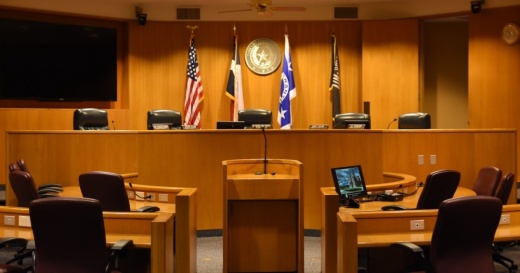Combined, the three outgoing officials have more than 60 years worth of experience on the court.
Precinct 3 Commissioner Gary Fickes, whose precinct includes most of northeast Tarrant County, was re-elected in 2020 and has a term that runs through 2024. Cities in his district include Grapevine, Colleyville, Southlake, Keller, Roanoke, Trophy Club, Westlake and Northeast Fort Worth,
Three open seats on the five-member court also mean there will be more new faces than old when the new court is seated in January. In addition to the court, Tarrant County will elect a new criminal district attorney, as Sharen Wilson is also not seeking re-election after serving in that role since 2015.
Add to that several other county offices without incumbents on the ballot—including several judgeships at various levels—and it makes for a potentially transformative year, beginning with the March 1 primary election, officials said.
A unique election cycle
G.K. Maenius has been Tarrant County’s administrator since 1988. He said that while there have been election cycles where a commissioner or two might roll off the court, the addition of an open seat for the county judge position does make this cycle unique.
“I think everyone is, you know, somewhat anxious about how that’s going to work, but I think that we’re gonna be just fine,” Maenius said. “It’s something that happens, and we’re going to go ahead and just work through that.”
Among the open seats to watch is the race to replace Whitley as county judge due to its leadership role, officials said. Already, that race has seen national figures weigh in.
But Whitley said voters should consider the duties of the county, the commissioners court and the county judge.
“A lot of what we do is administrative,” Whitley said.As outlined by a website operated by the Texas Association of Counties— www.texascountiesdeliver.com—some of the prime responsibilities for counties include overseeing tasks related to public safety, justice and courts; administering and holding elections; maintaining roads and bridges; tending to important public records; and tending to matters related to public health and emergency management.
“It requires a great deal more of collaboration than it does of just saying, ‘Well, this is the way I think I want it, and I’m gonna make it happen,’” he said. “Understanding county government is very important.”
Commissioners also appoint the county administrator who acts as the county’s chief administration officer and oversees roughly 4,000 employees.
Beyond that, they also adopt a budget and tax rate, approve budgeted purchases, fill vacancies in elective and appointive offices, set salary and benefits and maintain county buildings and facilities, among other things, according to the Texas Association of Counties.In 2022 and beyond, Maenius said he anticipates the county and the commissioners court will focus on a wide swath of issues. Those include addressing housing and the backlog in civil and criminal courts, making sure the county has adequate facilities to keep up with growth and investing in public health infrastructure.
In addition, the county will start projects that voters approved through the 2021 transportation bond package.
Spokesperson for the county
The role of county judge is a hybrid of sorts, officials say. In some ways it is on equal footing as the four other commissioners, and, in other ways, it means acting with more executive authority and as the spokesperson for the county. Elected at-large by the entire county, the person who replaces Whitley will be charged with presiding over the commissioners court and functioning as the head of emergency management for Tarrant County.
“When they come together as the commissioners court ... all five of those individuals are equal in stature on the court,” Maenius said. “But, on a day-to-day basis, the county judge is the one that represents the county.”
One area where county commissioners and the county judge stand out, relative to many other local elected officials—city council members, for instance—is that the county role is more of a full-time job with salaries starting at more than $150,000, according to county documents.
Another important part of the role is working with cities, Fickes said.
“One of the most critical things that we do is having a good working relationship with cities—and I’ve got about 12 or 13 in my precinct,” Fickes said. “I’ve got to know the city managers, the mayors, the public works directors. I’ve got to know all those people because that’s who I deal with.”
Whitley said it is important for voters to learn about candidates.
The newly elected commissioners and the new county judge will have “to collaborate and work with businesses, cities, schools and nonprofits, all to ... hopefully benefit all of the citizens of Tarrant County,“ he said.





